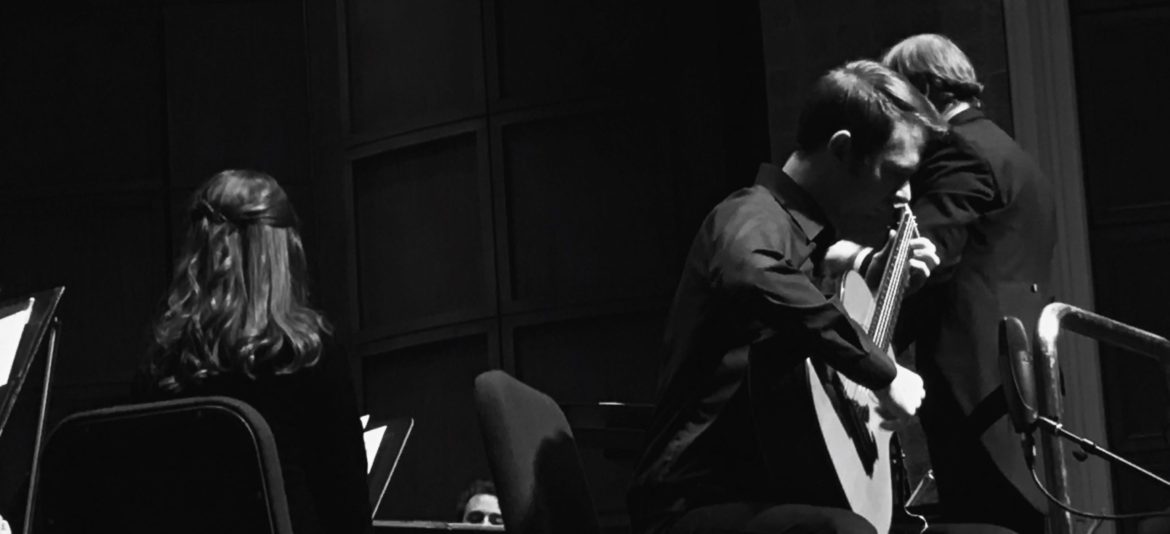On Thinking by Ear
“Words and numbers have unchallenged cultural hegemony. It is our job to promote the importance of sounds!”
Thus spake Vern Falby, one of the teachers I encountered in grad school that had a profound influence on my musical thinking. All of his theory classes were called “Thinking By Ear” followed by whatever the topic of the class actually was. They were very untraditional classes. The text was created by him and mostly consisted of work scores annotated with various “discovery procedures” that he invented to “suss out” (a favorite phrase of his) the inner workings of the piece. After doing many practice scores we would make Shenkerian reduction scores without using the notation. We would listen and sing the middle-ground lines to understand the melodic structure under the surface notes.
(Dr. Falby has spend the last few years creating an online version of this process if you are curious how this goes: http://www.thinkingbyear.com)
His approach was his own, and required a significant buy-in of time. Results varied for students. For me though, it worked, and it changed how I thought about many things. It was the first time I was truly challenged to do my analysis by ear and parse a form without consulting a score (we once spend several weeks of class listening to the first moment of Mozart’s 23rd piano concerto because someone asked a question about double-exposition form and he had never done one in class before. I have still never looked at a score but I know the form like the back of my hand). He had no interest in observations from the score that we could not actually hear when listening to the piece.
I bring this up because I have encountered an attitude among my students that the score is necessary for a deep understanding of classical music. I think this reveals two things: the kinds of training they have received and the quality of listening they are doing.
There is a historic connection between the growth of literacy and diminishing of memory. It was expected that by age 8 to 10 a young boy in the early medieval era would be “psaltered,” that is, would have memorized the 150 Psalms. It was not unusual for a poet to be able to reproduce (verbatim) an epic of several thousand lines after a single hearing. Even if these individuals were able to read, most things could not be read either because they were not written down or access to written works was so difficult. The only option to store information was in the memory, so it stayed in tip top shape.
Musical memory is no exception. I have played with folk and jazz musicians who can absorb a song in one hearing (including 32 bar changes, which is quite a feat). Most classical musicians I know cannot do this. It takes me many times around before a melody really sticks in my head, much less harmony and all the other information needed.
I am a heavily notation-reliant musician, but in genres where it makes sense I have moved toward working by ear as much as possible. The side effects are surprising. For one, if I learn a song by ear I don’t forget it. There are standards I figured out years ago and can still easily sit down with a guitar to play through. There are other standards I have looked up in the Real Book to play, and I couldn’t even begin to play them without looking again. A favorite phrase of one of my guitar teachers, Christopher Berg, is “recall is more powerful than review.” This is an essential learning principle. You have to make your brain do the work of remembering something or it won’t (anyone remember any phone numbers anymore?). Recall is a muscle in extreme atrophy because of the access to information we are never without.
It seems that we should be doing as much listening as score watching in our classes. I think we are perhaps reluctant because working on paper feels legitimizing in the academic setting. When STEM majors are doing advanced calculations and practicing surgery on robotic patients we can’t just sit in class and listen to music, can we? We can, and we should. Analytical listening is exactly the skill we should be building . We might assume our students are doing it, but I wasn’t and I doubt today’s students are either.
